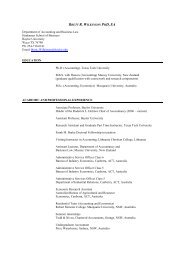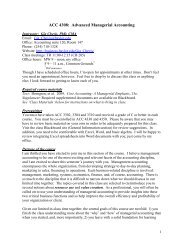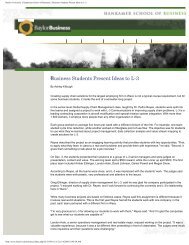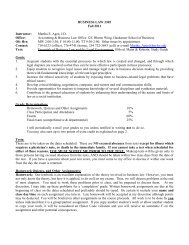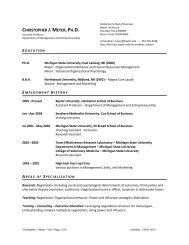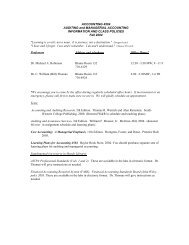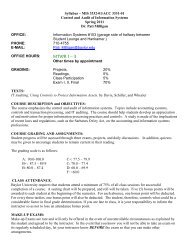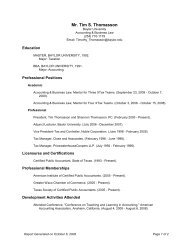Experiences of Successful Center Directors - Baylor University
Experiences of Successful Center Directors - Baylor University
Experiences of Successful Center Directors - Baylor University
Create successful ePaper yourself
Turn your PDF publications into a flip-book with our unique Google optimized e-Paper software.
are more important in the early stages, such as during fund raising. We started<br />
ours after we had our past successes, but it was largely through the push <strong>of</strong> the<br />
president and the chairman <strong>of</strong> the trustees. It is also probably our best fund<br />
raiser. And he and I had several pretty hard conversations about it. Why do we<br />
want this? Will it really help us and the program, or is it primarily for fund raising<br />
issues? So there is a lot <strong>of</strong> tension, I think, in advisory boards.<br />
And I think we have had a proliferation <strong>of</strong> advisory boards, not only in entrepreneurship<br />
but elsewhere at Babson, and sometimes I wonder about the real value<br />
<strong>of</strong> them. Some people say they are fabulous—they do this and that. The other<br />
extremists say, well, they are just a lot <strong>of</strong> heartache. To make it meaningful, you<br />
have to have meaningful programs. Maybe our advisory board is different than<br />
most in that it is a lot <strong>of</strong> entrepreneurs locally and internationally. In fact it is a<br />
much bigger challenge to get them together on a date and have really meaningful<br />
things for them to work on. So all I can tell everybody is that we built the whole<br />
program without an advisory board and we have had one at Babson for only two<br />
years. So if you like, we may be the other way around in terms <strong>of</strong> doing it.<br />
So I do not think advisory boards are a necessary part <strong>of</strong> what Jeff Timmons did,<br />
but he has been gone for six years. It fell to me to build links with key trustees<br />
whom I knew were interested in entrepreneurship. And I went to some length to<br />
build those links, inviting them to our regular, monthly entrepreneurship faculty<br />
meetings. We would get them to come and talk to the faculty and let the faculty<br />
talk to them. We also would have them judge business plan competitions. We<br />
sought their advice where I knew they had some advice and I wanted to listen to<br />
it, about industry perhaps or whatever. So, we did it very informally but nevertheless<br />
built some very good links into the trustees. It is always important because<br />
presidents come and go, deans come and go, academic vice-presidents come<br />
and go and who knows what might happen if you do not have those strong links.<br />
So I personally think that strong links with a few powerful trustees are more<br />
important than advisory boards.<br />
ANY OTHER SUGGESTIONS FOR THOSE TRYING TO START A PROGRAM?<br />
I think the endowed chair was an important signal when we raised the money for<br />
that. I think it was a commitment. Again, some <strong>of</strong> the Babson family still serve on<br />
the trustees, so that gave good visibility to the trustees. It showed that someone<br />
was willing to step up to the plate and put up a significant sum <strong>of</strong> money for an<br />
endowed chair, because in those days there were very few. So, it was pretty<br />
exciting to get people to come to Babson through that chair but that would not be<br />
so easy for the school today because there are just so many endowed chairs, in<br />
entrepreneurship. Nevertheless an endowed chair can attract a significant senior<br />
scholar who does not have to worry about tenure.<br />
44




